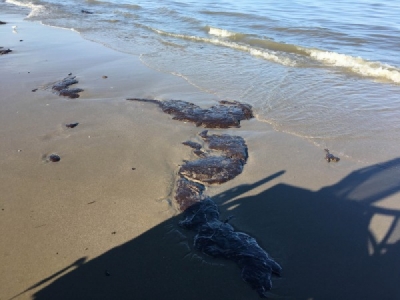
Posted on October 29, 2020
SLAUGHTER BEACH — As cleanup to a widespread oil spill continued Monday, officials urged the public not to handle any affected material or try to assist wildlife along the Delaware coastline.
The Delaware Department of Environmental Control said about 55 tons of oiled debris had been removed from beaches as of Sunday afternoon in a combined effort with the United States Coast Guard. The debris was enough to fill four construction Dumpsters, DNREC said.
“The job of removing oil from our beaches is challenging and labor-intensive, but we’re making progress,” said DNREC Secretary Shawn Garvin in an afternoon update.
“Our teams are getting more and more of it off our beaches every day.”
The response began Oct. 19 when oil patties from an unknown source first washed ashore at Broadkill Beach and then drifted to beaches on both the Delaware Bay and Atlantic Ocean.
At the time, DNREC said about 215 gallons may have spilled from an unknown source, but said that estimate could rise. Investigation into the source continued Monday and no update on the estimated amount was available, DNREC said.
Small globs of oil and oil debris were spread from Bowers Beach to Ocean City, Maryland, DNREC said Monday afternoon.
More than 100 personnel have been mobilized daily for the cleanup effort, DNREC said.
“Our crews and technology are yielding positive results,” said USCG Lt. Cmdr. Fredrick Pugh, federal incident commander. “We’re seeing a lot of this pollutant coming off of our beaches by the ton and that feels like a high level of productivity, but we’re not letting up.
“These communities need their beaches back.”
On Monday, DNREC issued an adisory for Slaughter Beach, Fowler Beach, Prime Hook Beach, Broadkill Beach, Lewes, Cape Henlopen State Park, Rehoboth Beach, Dewey Beach and the Indian River Inlet.
The public can report any findings of oily product or affected wildlife to its environmental hotline at 800-662-8802. Hazmat teams are available to respond to issues, DNREC said.
As oil washed ashore on Lewes and Dewey Beach last week, the towns closed their beaches temporarily. DNREC described some of the oil as “settling into a gravel-like substance, known as tar balls.”
Also, DNREC noted that local authorities posted signs at beach crossovers and on dune fences directing the public to avoid any oil patties and tar balls at the water’s edge and of area closures.
To aid cleanup efforts, DNREC said the four-wheel drive surf fishing crossing at Delaware Beach Plum Island Preserve, overseen by Delaware State Parks, remain closed to avoiding having vehicles track oil onto the sand.
While more reports of oiled birds were received, DNREC said the birds were not encumbered. Tri-State Bird Rescue & Research of Newark was at the ready to respond to assist birds that might require rehabilitation, DNREC said.
DNREC spokeswoman Nikki Lavoie said the federal Oil Pollution Act of 1990 provides funds for the cleanup. The act “streamlined and strengthened the U.S. Environmental Protection Agency’s ability to prevent and respond to oil spills.
“Money from the fund is used to hire certified contractors to do the cleanup, overseen by the U.S. Coast Guard and DNREC.”
Story provided by the Associated Press
Source: delawarestatenews





